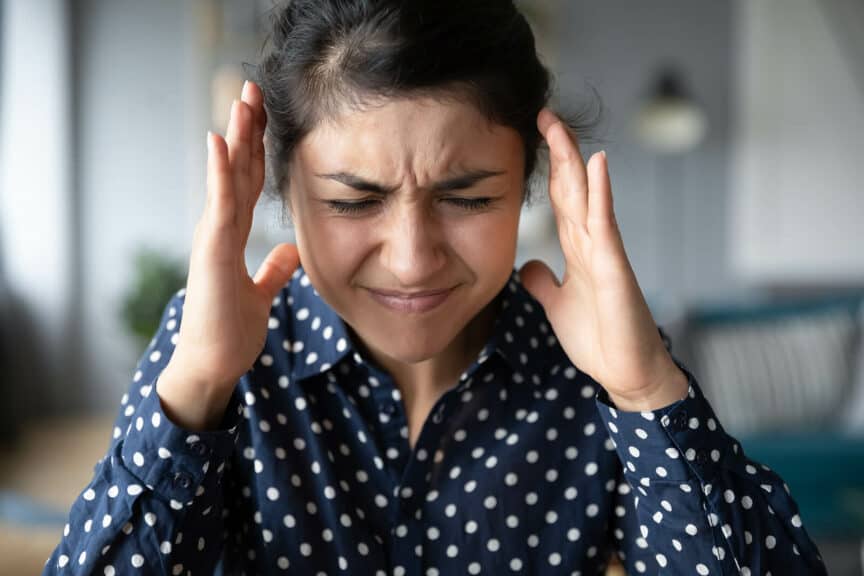Do you ever hear an unexplainable ringing or buzzing noise in your ears? Do you hear this sound when there is no noise in your environment? Known as tinnitus, this experience is more common than you may think. The Centers for Disease Control and Prevention (CDC) estimates that 50 million people experience some degree of tinnitus and that 20 million deal with chronic tinnitus.
Tinnitus is the experience of hearing a sound, in one or both ears, that only you can hear. This sound is most often described as a ringing, buzzing, or clicking like noise that can be intermittent to constant. Tinnitus can take a toll on everyday health and wellness in a few ways. It can prevent quality sleep, make it difficult to concentrate, produce fatigue and irritability, and make it challenging to hear and communicate effectively. According to the Hearing Health Foundation, 16 million people seek medical attention for tinnitus annually. Fortunately, there are effective ways that tinnitus can be managed, alleviating the impact it can have on daily life.
What causes tinnitus?
Tinnitus is not a medical condition itself but is a symptom of an underlying condition that a person is experiencing. According to the American Tinnitus Association, there are around 200 medical conditions that can produce tinnitus as a symptom. Common causes of tinnitus include:
- Hearing loss. The most common cause of tinnitus is hearing loss, a medical condition that reduces one’s capacity to hear and process speech as well as sound. Over 48 million people, 1 in 5, have some degree of hearing loss; making it the third most pervasive medical condition that people live with today. Hearing loss can be caused by several factors including: loud noise, aging, and existing medical conditions. Most often these factors damage the sensory cells that are in the inner ear. This prevents them from processing soundwaves effectively causing the brain to receive less auditory information. This produces a range of symptoms including tinnitus.
- Ear obstructions. This refers to any factors that prevent soundwaves from being fully absorbed and reaching the inner ear. Ear obstructions can include accumulated earwax, a perforated eardrum, bone growths etc. These factors physically block soundwaves from being processed effectively which can contribute to hearing loss as well as tinnitus.
- TMJ disorder. Another cause of tinnitus is temporomandibular joint disorder. This condition occurs when the joints that connect the jaw bone to the skull are misaligned or damaged. This can produce a range of effects including tinnitus.
- Medications. There are various types of medications that can produce tinnitus as a side effect. This includes specific types of antibiotics, anti-inflammatory medications, antidepressants etc.
The best way to address tinnitus depends on the underlying cause that is producing it. This can take some time to figure out because numerous conditions can trigger tinnitus.
How is tinnitus managed?
There are several ways that tinnitus is effectively managed. The following strategies can alleviate tinnitus:
- Treat hearing loss: because hearing loss is the most common cause of tinnitus, it is important to have your hearing evaluated. Hearing tests involve a painless process that measures your hearing capacities in both ears. The most common treatment for hearing loss is hearing aids which are electronic devices that help absorb and process sound. Hearing aids provide ample support that alleviates symptoms including tinnitus. Many of today’s hearing aids also offer tinnitus management features that are specifically designed to reduce tinnitus.
- Tinnitus retraining therapy: this is a type of sound therapy that focuses on training the brain to interpret tinnitus differently. Using low levels of white noise and deep breathing exercises while experiencing tinnitus can train the brain to associate tinnitus with mundane background noise. This deemphasizes it and provides relief.
- Reduce loud noise exposure: loud noise can worsen tinnitus so be sure to reduce your exposure as much as possible. You can do this by maintaining low volume settings on electronic devices, avoiding noisy settings, taking listening breaks throughout the day, driving with the windows rolled up, investing in noise canceling headphones etc.
These strategies can provide comprehensive support and relief. If you experience tinnitus, it is helpful to see a hearing healthcare specialty. Contact us today to schedule an appointment!

